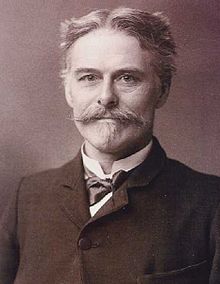Our website is made possible by displaying online advertisements to our visitors.
Please consider supporting us by disabling your ad blocker.
Edward Drinker Cope
Edward Drinker Cope | |
|---|---|
 Portrait of Cope, c. 1895 | |
| Born | July 28, 1840 |
| Died | April 12, 1897 (aged 56) Philadelphia, Pennsylvania, U.S. |
| Education | University of Pennsylvania |
| Known for | Bone Wars |
| Spouse |
Annie Pim (m. 1865) |
| Children | Julia Biddle Cope |
| Awards |
|
| Scientific career | |
| Fields | Paleontology, zoology, herpetology |
| Institutions | United States Geological Survey Haverford College University of Pennsylvania |
| Signature | |
Edward Drinker Cope (July 28, 1840 – April 12, 1897) was an American zoologist, paleontologist, comparative anatomist, herpetologist, and ichthyologist. Born to a wealthy Quaker family, he distinguished himself as a child prodigy interested in science, publishing his first scientific paper at the age of 19. Though his father tried to raise Cope as a gentleman farmer, he eventually acquiesced to his son's scientific aspirations.
Cope had little formal scientific training, and he eschewed a teaching position for field work. He made regular trips to the American West, prospecting in the 1870s and 1880s, often as a member of U.S. Geological Survey teams. A personal feud between Cope and paleontologist Othniel Charles Marsh led to a period of intense fossil-finding competition now known as the Bone Wars. Cope's financial fortunes soured after failed mining ventures in the 1880s, forcing him to sell off much of his fossil collection. He experienced a resurgence in his career toward the end of his life before dying on April 12, 1897.
Though Cope's scientific pursuits nearly bankrupted him, his contributions helped to define the field of American paleontology. He was a prodigious writer with 1,400 papers published over his lifetime, although his rivals debated the accuracy of his rapidly published works. He discovered, described, and named more than 1,000 vertebrate species, including hundreds of fishes and dozens of dinosaurs. His proposal for the origin of mammalian molars is notable among his theoretical contributions.[1]
- ^ MacCord, Kate (2019). "The impacts of assumptions on theories of tooth development and evolution at the turn of the nineteenth century". History and Philosophy of the Life Sciences. 41 (1). doi:10.1007/s40656-019-0245-2. PMID 30868283. Art. No. 12.
Previous Page Next Page


